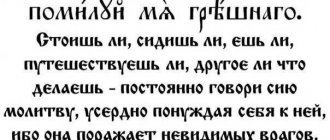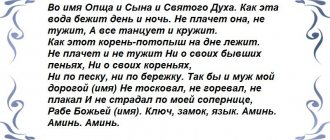Prayer to get rid of bad thoughts
Why can a person be overwhelmed by bad thoughts? How to protect yourself from them? After all, the worst hell is the one that a person builds for himself in his own head.
Bad thoughts can have the most terrible and tragic meaning for a person, because intention is already a lot.
This or that thought can be caused by a variety of reasons, right? In any case (whether we believe it or not, whether we want it or not), our gross, physical world is influenced in huge numbers by spirits, the inhabitants of the subtle world.
Any obsessive negative, heavy thought can be the fruit of a suggestion received from the evil one.
Despondency, according to the words of the Holy Reverend Father Seraphim of Sarov, is the most terrible sin, for it is the root of other sins, each individually and all together. Indeed, what won’t a person do when depressed?
The power of faith is the salvation of the soul
Anyone who sincerely believes in the Lord and trusts in His holy help, and can sincerely read a prayer for protection from bad thoughts, is reliably protected from all evil. God sees the sincere zeal of His children and delivers them from insidious despondency and inner bitterness. There are many prayers that help specifically against this seemingly insignificant sin - well, everyone is in a bad mood, it would seem that there is nothing sinful here.
But inattention to your soul does not pass without a trace - if you feel the first signs of bad thoughts visiting you, ask God to protect you from them before even from other troubles. If you remain in this state, anything can happen - the most terrible and unrealistic scenarios will come true so that you will not even notice the changes in yourself.
Keep your soul pure, avoid all evil and sin, but pay special attention and make special efforts to get rid of bad, obsessive, negative thoughts. After all, it is from spiritual purity that protects a true believer from the machinations of evil.
Rescue prayers
Orthodox Christians, to save themselves from obsessive, bad thoughts, use, on the advice of Father Seraphim, the Wonderworker of Sarov, two prayers - the simplest, most understandable and accessible to everyone. They can easily replace any bad thought that torments you; they discipline the mind and help you concentrate better.
It is called the “Jesus Prayer,” and, in addition to the full version, it can be expressed in only two words: “Lord, have mercy!” If you read the prayer constantly, then you begin to pray even at the subconscious level, which means that you are protected from negative obsessive thoughts at all levels, and in addition, you are fulfilling the commandment of the Apostle Paul, who said: “Pray without ceasing!”
Jesus Prayer
“Lord Jesus Christ, Son of God, have mercy on me, a sinner!”
In addition, Elder Seraphim advised reading a prayer against all defilement, also called the prayer to the Holy Trinity. We invite God Himself into the shadow of our heart, so that He can cleanse the dwelling of our spirit from all filth - both corruption and simply negative, obsessive and bad thoughts.
Prayer to the Holy Trinity
“Most Holy Trinity, have mercy on us; Lord, cleanse our sins; Master, forgive our iniquities; Holy One, visit and heal our infirmities, for Thy name’s sake.”
How to protect yourself from bad thoughts?
There are a huge number of non-Christian (overtly pagan, witchcraft, satanic) rituals and conspiracies. Not every prayer for bad thoughts is beneficial to our soul. Prayer to God is communication with the Creator himself, and not a conspiracy or a spell; it is important not to confuse the concepts and always distinguish between them.
It is forbidden to use church attributes: baptism water, wax candles, prosphora in rituals and ceremonies aimed at protecting against negative obsessive thoughts and bad aspirations.
We need to use the means given to us by the Lord with dignity, and not commit new sins, trying to get rid of the burden of past sins.
Epiphany water saves from despondency when drunk with faith and reverence, and not because of special words spoken over it. You can light a candle if you want to talk to God, pray to Him, ask for help and assistance in the fight against sins and sad thoughts. Prosphora can be eaten on an empty stomach to enlighten the mind and purify thoughts.
Each remedy offered by the Holy Mother Church is good and relevant, can and should be applied, but you should not treat it as a panacea or a magical amulet. Each appeal to God must be sincere and sensitive; in other cases, these appeals will not work, but will only plunge you deeper into your negative, bad and obsessive thoughts.
Other types of protective prayers:
- Prayers for cancer
- Prayers for evil thoughts
- Prayers for headaches
- Prayers for alcoholism
How to get rid of blasphemous thoughts?
I had the same thing)) Confession, communion, unction and mental settings-actions will definitely help)
He repented 100 times a day for several years. This wrong struggle can be very exhausting, so you need to clearly and firmly follow the advice of the saints) But repenting at home, talking in words, arguing - you absolutely can’t do that, it only feeds them, I tested this from experience) Phew. Therefore, you should strictly and firmly follow the recommendations. And in confession I’ll briefly talk about this. Paisius the Svyatogorets writes about this that while a person throws stones at them, they will bark.
I found an excellent medicine from St. Dmitry of Rostov!
Here is the link, here is everything in detail) https://azbyka.ru/otechnik/Dmitrij_Rostovskij/vrachevstvo-duhovnoe-protiv-smushayushih-i-hulnyh-pomyslov-po-chastjam-sobrannoe-iz-razlichnyh-otecheskih-knig/#0_10 https ://www.youtube.com/watch?v=jCAMZQhe5YU
So Saint Dmitry of Rostov tells us: “Since many, due to the slander of the enemy, are oppressed and confused by evil thoughts, especially blasphemous ones, it is useful that we get to know them and understand when they are a sin and when they are not, and that we learn how to heal them and how drive them away from you.
The thoughts that confuse us are threefold: unclean thoughts, thoughts of unbelief, and blasphemous thoughts. If you are confused by such thoughts, the remedy is as follows.
It is necessary to understand that there is no sin in evil thoughts when the will and mind of man do not deign them, especially when they hate and do not want them. But when the human mind and will voluntarily delight in them and, favoring them, hold them in their hearts, then the same thoughts are a mortal sin. And since he who is troubled by such thoughts and does not favor them is troubled, thinking that he is sinning, it must be said that he is only seduced by the devil due to his cowardice and ignorance of the difference between thoughts and assent. For when we think, we do not yet deign, and only then there is deign when we love evil thoughts, delight in them and desire them diligently, multiplying them in our mind. If we hate them and don’t want them, but they themselves come to our minds, although we turn away from them, then there is a sure sign that we do not have our permission for them and there is no need to be embarrassed in our conscience because of them. For the greater the reward we will receive from God, the more they oppress us, and we endure without deigning to do so.
Many people have incorrect and blasphemous thoughts about God, about the Most Pure Mother of God or God’s saints. Thus, it happens that when someone looks at the Mysteries of Christ, blasphemous thoughts immediately attack him like a dark cloud, even if he did not want them. We must not worry about such evil thoughts that come to us without our will, consider them as nothing and despise them as if they did not exist at all, and not be excited by them to the point of sorrow. For this very thing will comfort our enemy, the devil, when he sees us grieving about this, confused and doubting, and then he will bring upon us even more thoughts that confuse our conscience. But when he sees that we despise blasphemous thoughts and do not care about them, when he sees that we do not grieve and are not sad, then the shamed devil will run away from us, and we will remain at peace and without embarrassment. The main thing is that you just don’t deign to do it.
But some people think that by thinking like this, they have deigned to do so and are sick about it. This is just cowardice. After all, this clearly shows sinlessness and non-conviction, that they are sick and sad, hating the evil thoughts inflicted by the devil. After all, the devil, trying to offend us with all sorts of intrigues, among other things, tries to cause us sadness by putting into our mind blasphemous thoughts against God or His saints or the Divine Mysteries. But he will not succeed at all if we neglect him and cast away embarrassment from ourselves, without being at all saddened by his slander.”
Reasons for bad thoughts
Every anxiety has a source. It must be determined in order to understand how to proceed. Very often negative stories from the past interfere with life. A person experiences guilt (although it may be far-fetched) and constantly worries about this.
For other people, negativity becomes a character trait. They are also called complainants. They love to do soul-searching and have been pessimists since childhood.
Negative personal qualities also poison life. This may be self-doubt, in which any event or decision becomes a test. Suspiciousness can be viewed in the same vein. In such a person, anything can put anxiety in his head, from a news report to the conversation of random passers-by.
Of course, the source can also be real problems that a person cannot solve. Waiting for the outcome is what makes you nervous, imagining not the most optimistic scenarios in your head.
But religion explains in its own way why there are always bad thoughts in your head. It is believed that the cause of obsessions and experiences is evil spirits, demons. They need to be fought in an unconventional way - through prayer.
Let's look at several techniques that psychologists recommend using when bad thoughts arise.
Blasphemous thoughts do not always lead to sin
It may seem that blasphemous thoughts among believers are a terrible sin. After all, the Scripture says:
But whoever blasphemes the Holy Spirit will never have forgiveness, but he will be subject to eternal condemnation (Mark 3:29).
It will be bad for the one who sinned. God is invulnerable, and sin will fall on the head of the blasphemer as the curse of God.
Saint John Chrysostom wrote:
He who blasphemes inflicts wounds on himself.
However, not everything is so scary. The devil, trying to lead a believer astray from the true path, sends thoughts filled with the spirit of blasphemy against the Lord. But then everything depends on the person. Saint Dmitry of Rostov says this:
Sometimes people who have a general understanding of the Christian faith and have read something somewhere say that blasphemous thoughts should be despised. There is no need to do this: contempt is a direct consequence of pride, and pride is a mortal sin.
A person can go to hell if he succumbs to blasphemous thoughts
Prayer to help
We must not forget about protective prayer
To calm down during a panic attack, you need to read the following prayer:
You can also read the following prayer of protection:
Cross yourself three times. It is recommended to read this prayer every day before going to bed. In just a few weeks you will see the first results - your mind will become clearer, bad thoughts will go away.
To overcome phobias
The ritual for phobias is carried out at first rays of sun
In order to get rid of various phobias, you need to wake up with the first rays of the sun and say the prayer three times:
You can read protective words for several days in a row until you see the result.
For all rituals and prayers to bring the desired result, you must believe in their power. But at the same time, if various psychological, nervous or mental disorders appear, you should not rely only on the help of magic. It is imperative to seek help from qualified specialists and undergo prescribed medication treatment. If obsessive thoughts appear, consultation with a psychologist or psychotherapist is mandatory. Only after long-term work on yourself will you be able to direct your life in the right direction, get rid of anxieties, fears and other phobias.
Orthodox Life
website of the Gorlovka and Slavic diocese
Archpriest Nikolai Fomenko, dean of the Alexander Nevsky district in Slavyansk, reflects on prayer and shares practical tips that will help you pray more focused.
How to overcome absent-mindedness in prayer? I am not a teacher, but I can tell you what the holy fathers of our Church say in this regard. For example, his spiritual children turned to Saint John of Kronstadt and said: “When we began to pray, we did it carefully, but now we are distracted, distracted by other thoughts. What should we do?" He answered them very simply: “Pray like the first time.” He also advised me to find the red thread in each prayer, that is, the line that prompts the heart to cry out to God, and underline it with a pencil. When you read the prayer, you will definitely begin to pay attention to this line - to what inspires most. In the future, a person will learn to do this automatically, in every prayer, even unfamiliar ones. I do this too, it helps a lot. I read that when Saint John died, it turned out that his entire prayer book contained such emphasis.
It happens that during prayer you are overcome by obsessive thoughts. Saints Theophan the Recluse and John Climacus call this phenomenon “stolen prayer.” The unclean one wants to distract a person’s attention from prayer. It is he who imposes on the person praying thoughts about some other things. Moreover, thoughts may even be correct. People sometimes say: “I was standing in prayer, and a thought came to me.” You can immediately say: this thought is not good, even if it came during prayer. Evil spirits can also tell the truth - in order to later deceive more sophisticatedly.
If you read the prayer inattentively, you need to go back and re-read it again. I do this too, and the second time it turns out much more attentive. In the penitential canon, in the eighth song, there is a troparion that must be read twice. This is not because there were not enough troparia, but so that a person especially focused his attention on it.
If you fight, obsessive thoughts go away. For example, Saint John Climacus fought against inattention in this way: when his cell attendant read prayers, he bowed, thereby awakening his attention. One prostration at the beginning of the prayer, the other at the end. This is also a good way.
It is advisable for a family person to pray with his family. The home church must be built according to the word of the Lord: “Where two or three are gathered in My name, there am I in the midst of them” (Matthew 18:20). How good it is when a husband, wife and children pray! The prayers must be read one by one. Those who cannot read should listen, although little ones can start with the Trisagion.
The big problem lies in the fact that people “read out” prayers. They do this mechanically. God does not need such a prayer. Prayer is the raising of the mind and heart to God. If the mind is occupied with something completely different, or we do not understand what we are reading, what kind of exaltation can we talk about? For example, in prayers for Holy Communion, in the canon of Jesus the Sweetest there is a mention of Manasseh. Who is he? We need to understand in what sins we surpass him. But many believers do not know what Manasseh sinned, whose son he is, what is his notoriety? It’s okay if we don’t know something when reading the prayer text for the first time, but later we need to ask what it’s about! Therefore, I would advise the following: if there are any biblical characters in the texts, you need to focus your attention on them. If we don’t know anything about them, then either go to a priest or read in patristic literature. Prayer must be of high quality.
Second: prayer is the aspiration of the heart towards God. The Holy Fathers say that thinking about God is imputed to a person in prayer, so you need to encourage yourself to think about God. When you come to prayer, don’t just say memorized phrases, but actually pray. We have been crippling since childhood, demanding: “Read the prayer rule!” — that is, we want mechanical execution, a report. As a result, a person gets used to dryly doing what is required, it becomes a habit, and he does not understand what prayer is.
Look what is happening in the temples. They shout: “Pray, announcement!” - and everyone crosses themselves and bows. This doesn't concern you! We need to think with our heads, sober ourselves, otherwise we will become proud and decide that we are praying well, but we have not even begun to study.
You need to learn from patristic examples—say, from Saint Theophan the Recluse. At one time, he wrote many letters in which he answered questions from his spiritual children, including about prayer. For example, they write to him that they want to pray for their deceased father. The saint replies: “Go to church and ask the priest to slowly serve a memorial service.” A very important point: slowly! The tendency to pray while running or hastily will not lead to concentration. If a Christian prays according to the “shoot and run” principle, why does he even do it? There is also a rush in the temple. Have you come to pray? - So pray slowly.
In a church, it is very important how the readers work. A lot depends on them. If a person understands what he is reading, then the listener will understand, so there should be high demands on the readers in the church. Of course, those listening cannot relax either. How does it happen? — the priest anoints, and everyone starts chatting. You cannot pray carelessly. We also read from the prophet: “Cursed is he who does the work of the Lord carelessly” (Jer. 48:10).
In conclusion, I would like to wish everyone to learn to love God and communicate with Him on earth, so that we can continue this communication in the Kingdom of His love. This is why we were given earthly life.
Recorded by Ekaterina Shcherbakova










